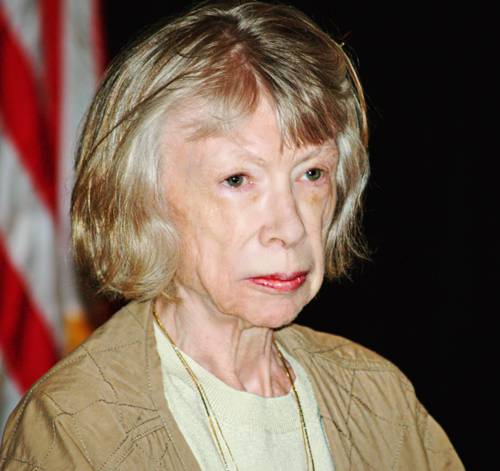
FAQ About Joan Didion

Who is Joan Didion?
Joan Didion was a celebrated American writer known for her unique blend of literary journalism, essays, and memoirs. Her work often explores themes of culture, politics, and personal identity, capturing the complexities of the human experience and American society. She gained recognition for her distinctive style and insightful narrative voice.

What are some of Joan Didion's most famous works?
Joan Didion is best known for her books "The Year of Magical Thinking," "Slouching Towards Bethlehem," and "The White Album." These works showcase her literary prowess in capturing the nuances of life and societal issues. "The Year of Magical Thinking" is a memoir about grief and loss, while the latter two are collections of essays that explore Californian and American life in the 1960s and 1970s.

How did Joan Didion influence American literature?
Joan Didion influenced American literature through her distinct voice and style that combined meticulous reportage, keen social commentary, and personal reflection. Her approach to new journalism, which blends factual reporting with a narrative style found in fiction, has inspired many writers and reshaped journalistic writing. Her work offers deep insights into the political and cultural changes in American life, establishing her as a critical observer of her times.

What is 'The Year of Magical Thinking' about?
"The Year of Magical Thinking" is a memoir by Joan Didion in which she recounts the year following the sudden death of her husband, writer John Gregory Dunne. The book explores themes of grief, memory, and the coping mechanisms humans use in the face of unexpected tragedy. It is celebrated for its emotional depth and candid exploration of loss.

Where was Joan Didion born?
Joan Didion was born on December 5, 1934, in Sacramento, California. Her early life in California significantly influenced her work, providing a backdrop for many of her essays and narratives that capture the spirit and challenges of the region.

What is Joan Didion's writing style known for?
Joan Didion's writing style is known for its clarity, precision, and evocative storytelling. She employs a nonlinear narrative style that often integrates personal reflections with broader social analysis. Her ability to convey complex emotions and societal observations in a concise yet impactful manner has made her a highly influential figure in both journalism and literature.

Did Joan Didion write about politics?
Yes, Joan Didion wrote extensively about politics, offering incisive critiques and analyses of political events and figures. Her essays often explore the interplay between politics and everyday life, highlighting the effects of political decisions on public consciousness and individual experiences. Works like "Political Fictions" exemplify her ability to unravel the complexities of the American political landscape.

Has Joan Didion received any notable awards?
Joan Didion received numerous awards throughout her career, including the National Book Award for Nonfiction for "The Year of Magical Thinking." She was also awarded a Pulitzer Prize for the same memoir in the category of Biography or Autobiography. Additionally, Didion was honored with the National Humanities Medal in 2012, reflecting her significant contributions to American letters and culture.

What is the significance of 'Slouching Towards Bethlehem'?
"Slouching Towards Bethlehem" is one of Joan Didion’s seminal works, published in 1968. The collection of essays chronicles the social, cultural, and political shifts occurring in California during the 1960s. It captures the unease and transformation of American society, with a focus on the counterculture movements. This work solidified Didion's reputation as a sharp observer and chronicler of her time.

What impact did Joan Didion have on new journalism?
Joan Didion's work significantly impacted the new journalism movement, characterized by a narrative style that incorporates literary techniques into factual reporting. Her ability to intertwine personal experience with investigative journalism helped to redefine how stories were told and received by audiences, influencing a generation of writers and expanding the possibilities of journalistic writing.

Why is Joan Didion considered an influential figure in literature?
Joan Didion is considered an influential figure in literature because of her profound insights into human behavior and social dynamics, coupled with her unique narrative style. She contributed significantly to both journalism and literature by challenging traditional forms and effectively capturing the zeitgeist of various American eras. Her work opened up new avenues for storytelling, particularly in blending the personal with the political and cultural.

How did Joan Didion's personal life influence her writing?
Joan Didion's personal life, including her experiences with loss, family, and her Californian roots, deeply influenced her writing. Her memoirs, such as "The Year of Magical Thinking" and "Blue Nights," are particularly introspective and explore personal themes of grief, family, and aging. These works reflect her ability to turn personal narratives into universal reflections, resonating with a wide readership.

What themes are commonly found in Joan Didion's work?
Common themes in Joan Didion’s work include grief, identity, political unrest, cultural change, and personal reflection. Her writing often delves into the uncertainties of life, the fragility of human connections, and the complexities of societal structures. Didion's exploration of these themes offers deep insights into both personal experiences and broader cultural phenomena.

Did Joan Didion collaborate with other writers?
Joan Didion frequently collaborated with her husband, the writer John Gregory Dunne. Together, they co-wrote several screenplays, including "The Panic in Needle Park," "A Star Is Born," and "True Confessions." Their collaborative work in screenwriting highlighted Didion's versatile talent beyond journalism and essay writing.

How did critics typically respond to Joan Didion's work?
Critics have generally responded very positively to Joan Didion's work, praising her unflinching honesty, keen observation, and distinctive style. Her ability to dissect the intricacies of American society and translate complex themes into accessible and engaging narratives has cemented her status as a literary icon. While some critics may have found her tone to be pessimistic, it is widely respected for its depth and insight.

Did Joan Didion write any fiction?
Yes, Joan Didion wrote several works of fiction in addition to her essays and memoirs. Her novels include "Play It As It Lays," "A Book of Common Prayer," and "The Last Thing He Wanted." These fictional works often explore themes similar to her nonfiction, such as existential despair, cultural dislocation, and personal struggle.

What is 'The White Album' about?
"The White Album" is a collection of essays by Joan Didion published in 1979. The book examines the disintegration of American social norms and institutions during the late 1960s and early 1970s. Through a blend of personal narrative and cultural commentary, Didion reflects on the chaos and unpredictability of an era marked by crisis and transformation.

How has Joan Didion been portrayed in popular media?
Joan Didion has been portrayed in various forms in popular media, including the 2017 Netflix documentary "Joan Didion: The Center Will Not Hold," directed by her nephew, Griffin Dunne. The film provides an intimate look at her life and work, exploring her personal experiences and significant contributions to literature. Didion’s iconic status has also been captured in numerous articles, profiles, and tributes that celebrate her legacy.

What role did California play in Joan Didion's works?
California played a central role in Joan Didion's works, serving as both a literal and symbolic backdrop for many of her stories. Her writing often reflects the cultural dynamics, social transformations, and existential undercurrents of the region. She depicted California not just as a setting but as an influential character in her narratives, exploring its impact on identity and American culture.

Did Joan Didion have any children?
Yes, Joan Didion had a daughter named Quintana Roo Dunne. Quintana was adopted by Joan and her husband, John Gregory Dunne. Didion wrote about her daughter and the profound impact of Quintana's life and untimely death in her memoir "Blue Nights," which discusses themes of parenting, loss, and memory.
